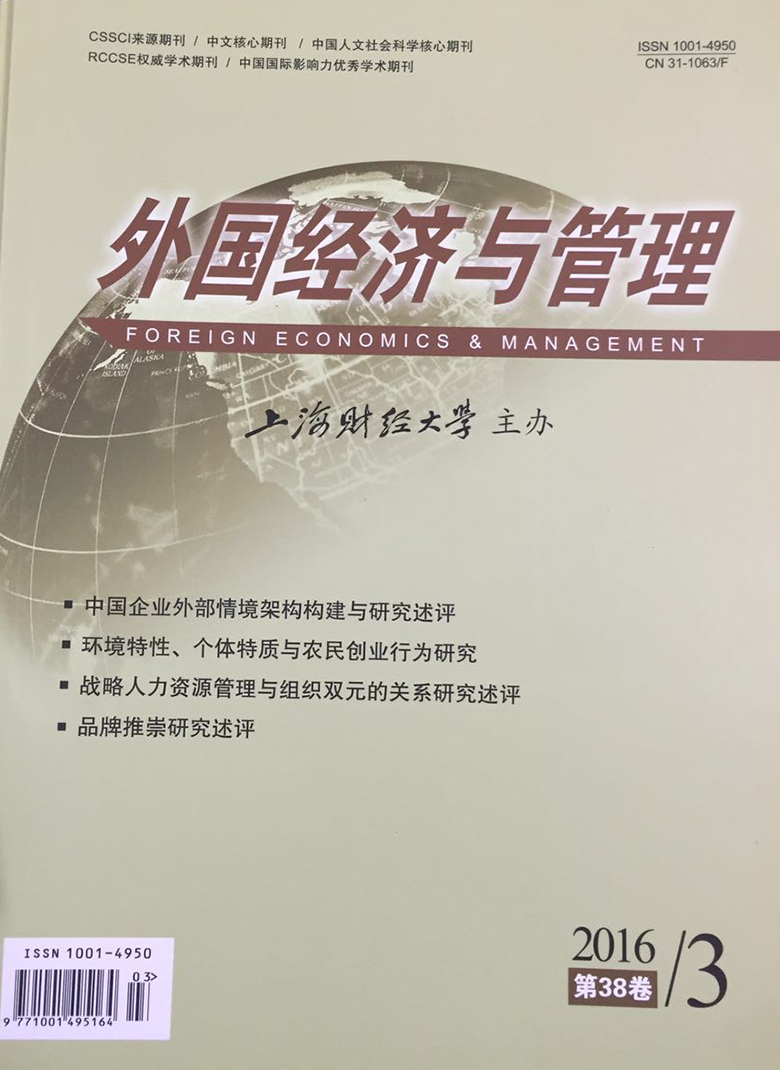本文通过构建三维交互模型,探求了家族涉入程度与企业技术创新投入之间的关系,并递进研究治理情境复杂性的二维交互作用与绩效困境的三维交互作用。研究发现:随着家族涉入程度的上升,家族企业技术创新强度降低;当治理主体复杂程度上升时,家族涉入对企业技术创新投入的负向影响加深;而随着企业经营困境的加深,治理主体复杂性所致的负向调节作用进一步加深。上述结论与行为代理理论的预期相悖,说明治理情境复杂度可能是行为代理理论的适用边界之一,该理论不宜用于解释治理情境复杂企业的风险承担问题。
家族涉入与企业技术创新
摘要
参考文献
1 Berrone P, et al. Socioemotional wealth in family firms theoretical dimensions,assessment approaches,and agenda for future research. Family Business Review, 2012, 25(3): 258–279
2 Block J H. R&D investments in family and founder firms:An agency perspective. Journal of Business Venturing, 2012, 27(2): 248–265
3 Carney M. Corporate governance and competitive advantage in family-controlled firms. Entrepreneurship Theory and Practice, 2005, 29(3): 249–265
4 Calabrò A, et al. The influence of ownership structure and board strategic involvement on international sales:The moderating effect of family involvement. International Business Review, 2013, 22(3): 509–523
5 Chen H . Family ownership,board independence,and R&D investment. Family Business Review, 2009, 22(4): 347–362
6 Chrisman J J. Variations in R&D investments of family and nonfamily firms:Behavioral agency and myopic loss aversion perspectives. Academy of Management Journal, 2012, 55(4): 976–997
7 Gómez-Mejía L R, et al. Socioemotional wealth and business risks in family-controlled firms:Evidence from Spanish olive oil mills. Administrative Science Quarterly, 2007, 52(1): 106–137
8 Gómez-Mejía L R, et al. Socioemotional wealth as a mixed gamble:Revisiting family firm R&D investments with the behavioral agency model. Entrepreneurship Theory and Practice, 2014, 38(6): 1351–1374
9 Kappes I. The effect of family governance on corporate time horizons. Corporate Governance:An International Review, 2013, 21(6): 547–566
10 Karra N, et al. Altruism and agency in the family firm:Exploring the role of family,kinship,and ethnicity. Entrepreneurship Theory and Practice, 2006, 30(6): 861–877
11 Knig A, et al. The family innovator's dilemma:How family influence affects the adoption of discontinuous technologies by incumbent firms. Academy of Management Review, 2013, 38(3): 418–441
12 Jensen M C and Meckling W H. Theory of the firm:Managerial behavior,agency costs and ownership structure. Journal of Financial Economics, 1976 (3): 305–360
13 La Porta R, et al. Corporate ownership around the world. Journal of Finance, 1999, 54(2): 471–517
14 Miller D, et al. Stewardship vs.stagnation:An empirical comparison of small family and non-family businesses. Journal of Management Studies, 2008, 45(1): 51–78
15 Morck R, et al. Corporate governance,economic entrenchment and growth. National Bureau of Economic Research Working Paper,No.10692, 2004
16 Nieto M J, et al. Understanding the innovation behavior of family firms. Journal of Small Business Management, 2015, 53(2): 382–399
17 Pepper A and Gore J. Behavioral agency theory new foundations for theorizing about executive compensation. Journal of management, 2015, 41(4): 1045–1068
18 PhelpsE SAltruism,morality,and economic theoryNew York:Russel Sage Foundation1975
19 Schmid T, et al. Family firms and R&D behavior:New evidence from a large-scale survey. Research Policy, 2014, 43(1): 233–244
20 Schulze W S, et al. Toward a theory of agency and altruism in family firms. Journal of Business Venturing, 2003, 18(4): 473–490
21 Su W and Lee C Y. Effects of corporate governance on risk taking in Taiwanese family firms during institutional reform. Asia Pacific Journal of Management, 2013, 30(3): 809–828
22 Vandemaele S and Vancauteren M. Nonfinancial goals,governance,and dividend payout in private family firms. Journal of Small Business Management, 2015, 53(1): 166–182
23 Wiseman R M and Gómez-Mejía L R. A behavioral agency model of Managerial risk taking. Academy of Management Review, 1998, 23(1): 133–153
24 Wu J, Tu R. CEO stock option pay and R&D spending:A behavioral agency explanation. Journal of Business Research, 2007, 60(5): 482–492
25 Zellweger T M, et al. Why do family firms strive for nonfinancial goals? An organizational identity perspective. Entrepreneurship Theory and Practice, 2013, 37(2): 229–248
26 陈 凌, 吴 炳德. 市场化水平、教育程度和家族企业研发投资. 科研管理, 2014 (7): 44–50
27 杜 正胜. 传统家族试论[A].黄宽重,刘增贵.家族与社会[C].. 北京:中国大百科全书出版社, 2005
28 费孝通乡土中国生育制度北京:北京大学出版社1998
29 贺 小刚, 连 燕玲, 李 婧, 梅 琳. 家族控制中的亲缘效应分析与检验. 中国工业经济, 2010 (1): 135–146
30 贺 小刚, 连 燕玲, 张 远飞. 经营期望与家族内部的权威配置——基于中国上市公司的数据分析. 管理科学学报, 2013 (4): 63–82
31 李 青原. 论机构投资者在公司治理中角色的定位及政策建议. 南开管理评论, 2003 (2): 28–33
32 马 富萍, 郭 晓川. 高管团队异质性与技术创新绩效的关系研究——以高管团队行为整合为调节变量. 科学学与科学技术管理, 2010 (12): 186–191
33 任 海云. 公司治理对R&D投入与企业绩效关系调节效应研究. 管理科学, 2011 (5): 37–47
34 邵 传林. 制度环境、产权性质与企业家创新精神——来自中国工业企业的经验证据. 证券市场导报, 2015 (3): 20–25
35 王 菁, 程 博, 孙 元欣. 期望绩效反馈效果对企业研发和慈善捐赠行为的影响. 管理世界, 2014 (8): 115–133
36 王 明琳, 徐 萌娜, 王 河森. 利他行为能够降低代理成本吗?——基于家族企业中亲缘利他行为的实证研究. 经济研究, 2014, 4(3): 144–157
37 魏 明海, 黄 琼宇, 程 敏英. 家族企业关联大股东的治理角色——基于关联交易的视角. 管理世界, 2013 (3): 133–147
38 于 忠泊, 田 高良, 齐 保垒, 张 皓. 媒体关注的公司治理机制——基于盈余管理视角的考察. 管理世界, 2011 (9): 127–140
39 周 建, 尹 翠芳, 陈 素蓉. 董事会团队属性对企业国际化战略的影响研究. 管理评论, 2013 (11): 133–143
引用本文
闵亦杰, 陈志军, 李荣. 家族涉入与企业技术创新[J]. 外国经济与管理, 2016, 38(3): 86–98.
导出参考文献,格式为:





 6354
6354  5940
5940

